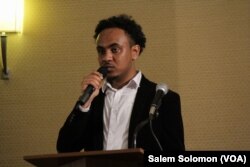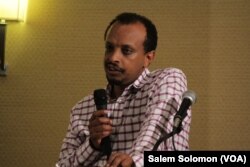In September 2001, Eritrean authorities launched an unprecedented crackdown on the free press. Seven of the country’s independent newspapers were shut down. At least 11 journalists were arrested in the roundup, and several more were jailed the following month. None of them have been heard from since that time, and their whereabouts are unknown to this day. The Committee to Protect Journalists says approximately 17 journalists remain in prison in Eritrea, although it is not known how many of the prisoners are still alive.
Although they are gone from view, their colleagues, friends and family want to make sure they are not forgotten. At a recent event in Alexandria, Virginia titled “Memory for Forgetfulness,” Eritreans shared stories about the journalists and advocated for their release.
Among the attendees was Robel Asrat, whose brother Amanuel Asrat was arrested on Sept. 23, 2001 and who has been held incommunicado since then. Amanuel was a celebrated poet and the editor of Zemen, a newspaper covering the arts and literature. His poem “The Scourge of War” has been translated into 15 languages.
Robel, who was a child at the time, recalled the painful memory of pointing out his home address to security officers dressed in civilian clothes who came to arrest his brother. He said for the first six months of his brother’s detention he was kept in Asmara, and the family was able to bring him food, although they could not speak to him. After that Amanuel was transferred, possibly to Eiraeiro, a maximum security prison north of the capital, and has never been heard from since.
“After the six months, we were completely in the dark, and those whom we asked weren’t able to give us information, and they told us not to look for him anymore,” he said. “Until today we still hope to see him, and my parents have never stopped praying for his release.”
Robel remembers his brother as a generous person who never stopped giving to others, even at his own expense. He also wrote poetry for those needing to be cheered up or inspired. Robel says he wishes he could pass on a message to his brother. “He always repeated one word...the word he repeated was ‘resilience.’ I would ask him to be resilient like his word,” he said.
“There is no problem that stays the same, and one day the problems that look like mountains will be lifted and then there is light, the light that God has created. And he will see the light he has been prevented from seeing.”
Crackdown on journalists
The 2001 crackdown on journalists in Eritrea came at the end of a war with Ethiopia that cost the lives of 70,000 to 100,000 people. On Sept. 18, 15 high-ranking officials in Eritrea’s ruling party, the People’s Front for Democracy and Justice published an open letter to President Isaias Afwerki calling for reform in government and accusing the president of taking actions that were “illegal and unconstitutional.” The letter as well as interviews with the dissident members who became known as the G-15 were widely published. What followed was a severe constriction of free speech in the country.
Since that time, President Isaias has claimed that there was never an independent media in Eritrea and that newspapers in operation prior to 2001 were funded by outside sources, including the CIA. In a 2003 interview, he told Radio France Internationale that journalists operating in Eritrea had been paid to sow dissent inside the country. “You cannot say a spy is a journalist,” he said. “In the middle of the war we had to check them. We had to say enough is enough."
'Vital watchdog'
Yosef Berhe, founder of Reem, one of the first independent newspapers in Eritrea, said that prior to the crackdown, newspapers were playing a vital watchdog role in Eritrea. They were exposing corruption, advocating for reform and offering a venue for readers to voice opinions about the future of the country.
“One of the good parts of the newspapers is that opinions of regular people were being published, including letters,” he said. “So they had access. That was a good thing. I feel like it was one of the main benefits… If that continued for five to 10 years, how great would that be? That’s the best thing newspapers did for the society, in my opinion.”
Keep memories alive
Abraham Zere, executive director of PEN Eritrea, a co-organizer of the event in Virginia and a former columnist for Hadas Eritrea, said he is not optimistic that space will open up for journalists any time soon.
“I wouldn’t guess that there would be free press in Eritrea in the near future,” he said. “As long as the regime is there it is not going to allow free press. It is continuing to get worse and there is not a turning point. Unless the regime is no longer in power, I don’t expect change or even forgiveness for the ones in jail. We have no hope that they will release those in prison because they are adding crime upon crime, and I don’t see any way that they will turn back time.”
Others hoped that even if the event does not have a political impact, it keeps the memories of the jailed journalists alive. Bereket Stephanos, an IT professional who trained as a lawyer in both Eritrea and the U.S., knew some of the journalists while he was a student at Asmara University. He hopes they understand that their suffering is not in vain.
“I read this quote from a Martin Luther King speech when the four little kids died in a church in Birmingham Alabama, and he said, ‘unmerited suffering is redemptive’ and God has a way of making good out of evil, and I personally believe that all this suffering will bring about some good,” he said.
“I personally would like to remind them [that] I did not forget them, and when you look at this maybe 50 years in the future or maybe 100 years in the future, we’re all going to die, we’re all going to be dust in history, but they will be the monuments people will remember. None of us will be as big a picture as they are so that should give us some comfort.”






